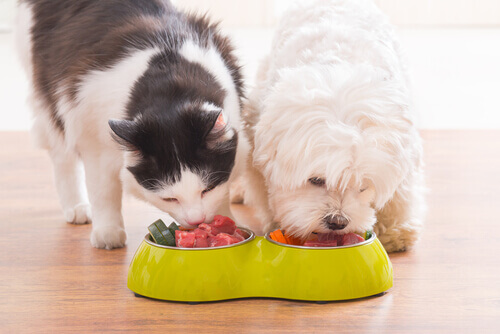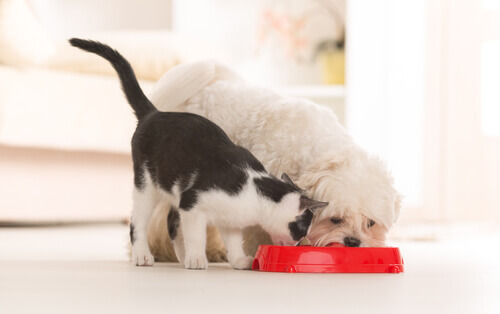Can Cats and Dogs Eat the Same Thing?


Written and verified by the lawyer Francisco María García
Many people mistakenly believe that pets eat everything, and that cats and dogs can eat the same. This isn’t the case, and many human foods are considered very harmful to them.
We need to consider that food elaborated for different species contains ingredients that satisfy the nutritional and caloric requirements of each one of them.
In addition, size, age, species and characteristics of the pet determine what it should ingest, its content, frequency and quantity. This will make the difference between good nutrition and malnutrition.
Although dog and cat food or processed food are very similar, they differ considerably. This can be verified by reading the product label. In this article, we’ll see information about what cats’ and dogs’ diets need to include, and the reasons why they shouldn’t eat the same.
Cats’ nutritional requirements
In their evolution throughout history, cats have been kept on a carnivorous diet. That’s why they still require a high intake of protein and fat in their diet. That amount isn’t recommended for dogs.
We must also mention taurine, an organic antioxidant acid that protects the health of the feline heart as well as its brain, muscles and membranes. This substance also works as an important neurotransmitter. Its deficiency in the medium and long term causes blindness, nervous system problems, heart disease, and finally, death.

Likewise, an essential fatty acid required by cats is called arachidonic, which maintains the good health of their fur and skin.
Vitamins B1 and B12 should also be included in a good cat diet. B1 transforms glucose into energy for muscles functioning and the nervous system. B12 maintains the amount of red blood cells and optimizes iron levels in the body.
One of the indispensable nutrients cats is vitamin A. Canine food lacks this vitamin because the dog’s body produces it. In general, cats need more vitamins in their diets than their canine companions.
Dogs’ nutritional requirements
In the early stages of their evolution, dogs became strictly carnivorous, but later on, they developed a more varied diet. This led them to become the omnivores they are today.
The commercial feeds on the market include all the necessary components to maintain their optimal nutrition and health.
One of the dietary components required by the dog’s metabolism is beta-carotene. The body processes beta-carotene into vitamin A, which is a great antioxidant. It helps maintain a healthy vision, reproductive processes, and the bone and epithelial systems.

As an illustrative example of another important vitamin, while cats require 30 units per kilogram of vitamin E, dogs need 50 units. As we can see, dogs require less fat and protein than cats.
Canine diets must include two essential fatty acids: linoleic acid and alpha-linoleic acid. These nourish the muscles and the fur, create hormones and generate necessary elements for the cells.
Consequences of an inadequate diet in pets
If dogs and cats live together in the same house, it’s very likely that, from time to time, they will eat from each other’s feeders. If it’s occasional, there’s no problem, but it shouldn’t become a habit. To avoid this, there should be a separation.
In the medium and long term, an inadequate diet in pets will cause vomiting, diarrhea and other discomforts. In the long term, the impact is more serious, as kidney and liver damage may occur.
Conclusions
In conclusion, cats and dogs can’t eat the same food because they run the risk of malnutrition, with possible consequences for their health. Given everything mentioned above, it’s clear how harmful it can be to give the pet food that doesn’t correspond to its species. The consequences are even more significant in the case of felines.
The recommendation is clear: cats and dogs can’t eat the same thing. Hence, a veterinarian should indicate the best diet and provide quality products that guarantee an optimal health state.
This text is provided for informational purposes only and does not replace consultation with a professional. If in doubt, consult your specialist.